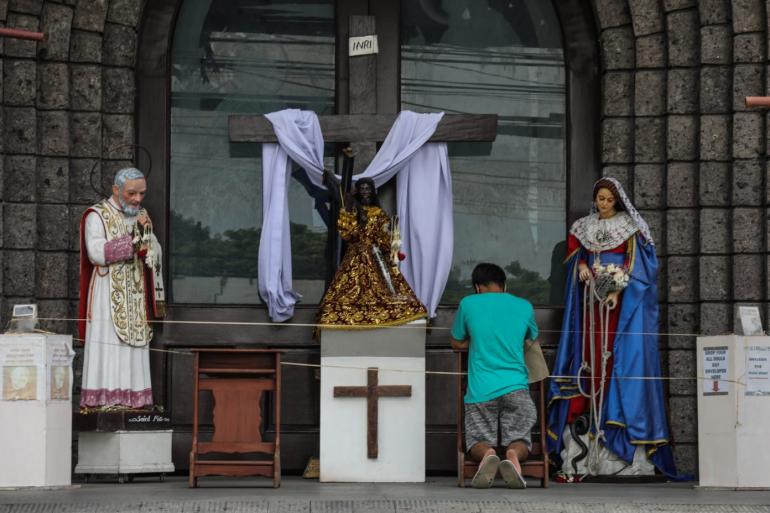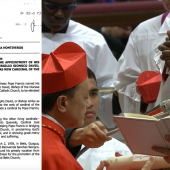Afraid of God?

Bishop Pablo Virgilio David of Kalookan
“And do not be afraid of those who kill the body but cannot kill the soul; rather, be afraid of the one who can destroy both body and soul in hell.” – Mt 10:28
I was once facilitating a Bible study session with a group and we were discussing the Gospel for today, Matthew chapter 10. When we got to verse 28, that verse which I have just quoted now, I asked them two questions: 1) Can you tell me whom Jesus was referring to when he said “Do not be afraid of those who can only hurt or kill your body?” 2) Who was Jesus talking about when he said “Be afraid rather of those who can throw both body and soul in hell?” To question number one, all of them said, “our fellow human beings.” And to question number two, all of them said “God.”
I was of course surprised, so I threw back a follow-up question: “Why God?” They also answered in unison: “Because only God can destroy both body and soul in hell.” And I said, “Do you really believe that?” And they said, “But that’s how we’ve always been made to understand it.” So I said, “So you’re afraid of God?” And they answered again in unison, “Of course we are. We have always been taught to be God-fearing.” And I asked, “Why should you be afraid of God?” The answer was automatic, “Because God can punish us in hell.”
I couldn’t believe what I was hearing. I wanted to cry. I wanted to shake each one of them and say, “What did they do to you? Who is it that taught you that? When did you start thinking of God that way?” But they just looked at me with mouths open, wondering why I was reacting vehemently to their answers.
Is it possible that many of you who are following this online Mass are in the same predicament? Is it possible that you have also imbibed the idea of a fearful, a punishing God who is threatening to throw you into hell? I would kneel before you and ask your forgiveness if we ever taught you that or even gave you that impression, because it is wrong. Nothing can possibly farther from the truth than that. So I proceeded to explain.
What Jesus is really saying, I told them, is, “Do not be afraid of your fellow human beings who can hurt your bodies when they are under the spell of evil. Be afraid rather of the Evil One who can also possess you and hurt of destroy you, not just physically but spiritually as well.” The context is the mission sending of the apostles by Jesus in Matthew Chapter 10, which is called the Mission Discourse, where Jesus gives instructions to his disciples on how they should conduct themselves when they go out on a mission.
He is telling them, or maybe since his mission goes on up to the present, I should say he is telling us “Do not allow yourselves to be intimidated by those who speak lies, those who promote falsehood. What you hear in the dark you must say in the light. What you hear in whispers you must proclaim from housetops. Why? Because the Evil One loves to move about in secrecy and lies. He is an expert in bullying and intimidation. He will hold an apple and say, “Repeat after me; this is an orange.” You hesitate because you know you’re seeing an apple. He points a gun on you and he says, “Repeat after me; this is an orange.” And, in trembling, you say, “That is an orange.” And he grins with delight and says, “That’s better. Now we understand each other.”
But you hear someone whispering from behind, “But that’s an apple, not an orange.” And everybody looks at you with dagger stares and tells you to shut up. And you shut up and are now terrified and perhaps even begin to entertain the thought that maybe you are wrong, that maybe it was really an orange.
Remember that famous fable of the Emperor’s new clothes? Remember the story of the king who was fooled into believing that he was really wearing the most expensive clothes that were so fine they could not be seen by people with no taste and no culture? Remember how everybody kept quiet and was afraid to make a remark about what they were seeing? The climax of the story was when one little boy shouted, “The King is naked!”
Brothers and sisters, that little boy was Jesus. He came into this world precisely to expose the nakedness of those who lord it over, those who think they are clothed in armor but are actually naked, because they are deluded, they are under the spell of evil. The prophet Jeremiah whom we heard in our first reading is also like that little boy. He was surrounded by many enemies because he dared to proclaim the truth, he dared to call a spade a spade.
I have good news for you today. It is not God, but the Evil One, whom you should be afraid of. And by BE AFRAID, what he really means is BE CAUTIOUS, BE ON GUARD, BE VIGILANT! Exactly as we are learning to be cautious and vigilant with COVID-19 because we know how infectious this disease can be. Yesterday, I heard from someone who stayed home during the whole quarantine period that they are now under observation and have to isolate themselves for 14 days because their house help tested positive of COVID-19 after being tested, and she did not even show any symptoms.
I was watching a BBC documentary recently about a reporter trying to do investigative work in order to trace the origins of the new coronavirus. Where is ground zero? How did this virus, which presumably infected only animals like bats and pangolins, mutate and jump to human beings? Who was the very first human being to be infected, or patient number 1? How did this virus get transmitted to others exponentially until it became a pandemic, meaning it has spread throughout the whole world?
If St. Paul were here today, he would probably say, “That is exactly how evil works in the world.” I prefer to use the word “evil” rather than “sin”. Evil, St. Paul says, entered through one man, and, as soon as humans got infected by evil, death has also entered the world, and the infection has spread far and wide to all humankind. Sin is about being under the spell of evil. The enemy is not the infected one but the virus itself, which, unfortunately, we do not see. Like the new coronavirus, evil can also work asymptomatically.
I hope you are now beginning to understand why I said we should not be afraid of God. The biblical expression God-fearing does not mean what others understand it to mean. It is better translated as “God-loving”, what you actually fear is separation from God. Listen to what St. Paul says very clearly in Romans chapter 8: “If God is for us, who can be against us? Who can separate us from the love of God?” Separation from God is what hell is about, for St. Paul. His question can be restated into, “Who will condemn us into hell?” In fact, he asks precisely that question in Romans 8:32-33. He immediately cancels out God the Father. How can he condemn you when “He who did not spare his own Son but handed him over for us all…Who will bring a charge against God’s chosen ones? It is God who acquits us.” (Acquit means “declare not guilty”.) So, if it is not God the Father who will condemn you, who will? Is it God the Son? He answers that in v. 34 and says, “But it is Christ [Jesus] who died, rather, was raised, who also is at the right hand of God, who indeed intercedes for us!” In the end he says, NOTHING CAN SEPARATE US FROM THE LOVE OF GOD IN CHRIST JESUS.
The mission of Jesus is to save us, not to condemn us. Remember, Jesus says that in that famous saying John 3:21, “God did not send his son into the world to condemn the world but rather to save it.” So I don’t see why we should be afraid of being condemned by either the Father or the Son. Who will throw you into hell?
Definitely NOT GOD! Maybe the Evil One, if he succeeds in putting you under his spell so that you yourself separate from God. But here’s the good news, God will not only not condemn you. He is willing to go down to hell for you. That is what he did when he emptied himself and became man, when he faced his suffering and death on the cross. ALL FOR LOVE OF YOU, because he would not allow the Evil One to have the last say on you.
So, you see? The love of Christ should stir up in you, not fear, but courage. Remember how the apostle John says, “Perfect love casts out all fear?” God’s unconditional love should be your ultimate source of confidence. You are worth more than a thousand sparrows! Every hair of your head is counted. God is not your enemy; the evil one is! And you don’t fight evil alone; God is with you. He does not give up on you even when you get infected. The only thing he wants to destroy is the virus of evil, not us, not even those infected by it.
Today happens to be Fathers’ Day too. If children grow confident, courageous, not easy to intimidate, it means their fathers did a good job on them. Remember how your father taught you to ride on a bicycle? How he assured you you would not be hurt because he was there to support you? That if you fall, he was there to catch you? That is what fathers are supposed to be. But if children grow fearful, and their father’s name instills terror, then there must be something wrong. It means you had an earthly father who has also been infected by the virus of the enemy. Even in such circumstances do not despair. You have a greater Father who will always be there for you through his beloved Son Jesus Christ, who has revealed to us the true face of God, the Father who remains consistently the Merciful and Loving Father to his children, no matter what.
Bishop Pablo Virgilio David of Kalookan delivered this homily for the 12th Sunday in Ordinary Time on June 21 2020.
Radio Veritas Asia (RVA), a media platform of the Catholic Church, aims to share Christ. RVA started in 1969 as a continental Catholic radio station to serve Asian countries in their respective local language, thus earning the tag “the Voice of Asian Christianity.” Responding to the emerging context, RVA embraced media platforms to connect with the global Asian audience via its 21 language websites and various social media platforms.














